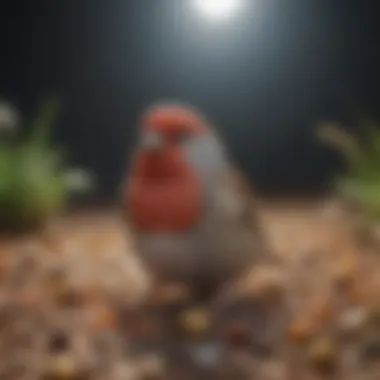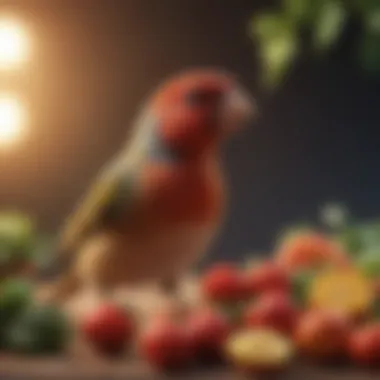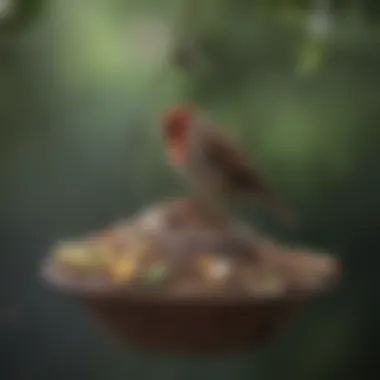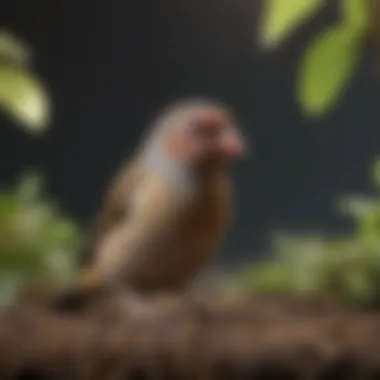Essential Guide to Finch Nutrition for Pet Owners


Intro
Finches, those vibrant little birds, are often a source of immense joy for their owners. However, providing them with a balanced diet is paramount for their health and well-being. It’s not just about filling their feeders; understanding the minutiae behind their nutritional needs can be a game-changer. This guide aims to unpack the complexities of finch nutrition, shedding light on dietary essentials and how they affect your bird’s quality of life.
A finch's dietary requirements can vary widely from one species to another, influenced by factors such as age, size, and even activity level. Many owners may not realize the profound connection that exists between a finch’s diet and its health. By the end of this guide, you will not only understand the significance of appropriate feeding practices but also discover how to enrich your feathered friend's life through informed choices.
The Importance of Finch Diet
Feeding finches the right diet is not just about filling their food bowls; it’s about nurturing their overall health and well-being. A finch's diet significantly influences its vitality, immune system, and even its lifespan. Just as humans thrive on a balanced diet rich in vitamins and nutrients, so too do these charming birds.
To start, one must consider the varied nutritional needs of different finch species. Each breed has unique requirements that stem from their natural habitat and feeding habits in the wild. For instance, some finches typically consume a diet high in seeds, while others might supplement their meals with fruits and vegetables. Recognizing these needs ensures that owners provide a diverse and appropriate range of foods when caring for their finches.
Understanding Finch Nutritional Needs
Finches are small songbirds that, by nature, demand a well-rounded diet. Their nutritional needs can be broken down into several key components. The primary elements include proteins, carbohydrates, and fats, accompanied by essential vitamins and minerals that facilitate healthy growth and development.
- Proteins are crucial for muscle development and tissue repair. Common protein sources are egg food or cooked legumes.
- Carbohydrates, primarily from seeds, provide energy. Seed mixtures that contain canary seed or millet can help supply necessary energy.
- Fats, often found in seeds like sunflower seeds, give additional energy and can bolster their overall health.
Additionally, vitamins and minerals are paramount. Finches need a mix of vitamins A, D, E, and B-complex vitamins, along with calcium and phosphorus. Leafy greens and certain fruits can be excellent sources of these essential nutrients. However, balancing out the diet is important, as overindulgence in any single food type can lead to deficiencies or imbalances.
Consequences of Poor Nutrition
Neglecting a finch's dietary needs can lead to severe setbacks in their health and well-being. If a finch is fed a lackluster diet, it may show symptoms that are all too familiar to bird enthusiasts.
- Obesity is a common issue stemming from overfeeding or offering calorie-dense foods without necessary nutritional diversity. Excess fat can lead to lethargy and reduced personal grooming.
- Malnutrition often results from a lack of variety and can manifest in various forms, including poor feather condition and susceptibility to illness.
- Behavioral Issues might also arise. Finches may become irritable or withdrawn when not consuming appropriate nutrition. Observing changes in their singing habits or social interactions can give clues about their diet.
Types of Finch Food
Understanding the types of food available for finches is crucial to ensuring that these beautiful birds lead healthy and vibrant lives. A balanced diet goes beyond mere sustenance; it plays a significant role in their overall well-being. Just like humans enjoy a variety of flavors and textures, finches thrive on diverse nutritional sources. Let's dive deeper into the different types of finch food each with its own merits and pitfalls.
Seed Mixtures
Seed mixtures are the bread and butter of many finch diets, and rightly so. These blends consist of various seeds, offering a range of proteins and fats essential for a finch's health.
Common Seed Types
Common seed types, such as millet, canary seed, and sunflower seeds, serve as the backbone of many formulations. Millet is often the go-to choice, as it is high in carbohydrates and low in fat. Finches tend to relish it, making seed mixtures appealing and encouraging the birds to forage more actively. However, if too many sunflower seeds are included, they can lead to weight gain due to their high-fat content. Thus, it’s vital to find a balance when selecting seed types.
Commercial Seed Mixes
Now, take a look at commercial seed mixes. These pre-packaged blends often include a variety of seeds and grains designed to give finches a well-rounded diet. Their convenience is a significant selling point as they save time for busy owners. However, while they simplify feeding, the quality of ingredients can be mixed. A wise pet owner should scrutinize packaging to avoid those mixes that contain fillers—things like corn and soy—that won't benefit their birds.
Homemade Seed Mixes
For the more hands-on finch owner, homemade seed mixes present a rewarding option. Creating a blend allows for personalization, ensuring specific nutritional needs are met. In essence, it can include organic options that might be harder to find in store-bought mixtures. However, a drawback here is the time and effort involved in sourcing and mixing different seeds. If not done correctly, they may also inadvertently include imbalanced proportions, risking nutritional inadequacies.
Pelleted Diets
Pelleted diets have gained popularity for their convenience and nutritional value. They often contain a more stable and consistent nutrient profile compared to seed mixtures. With their balanced formulation, they can eliminate the risk of selective feeding that finches sometimes exhibit when presented with a variety of seeds.


Benefits of Pellets
One of the standout benefits of pelleted diets is their comprehensive nutritional content. Loaded with vitamins, minerals, and fiber, pellets can drastically simplify a finch's dietary management. They also help to maintain optimal digestion and overall health. However, some finches may reject pellets, preferring seeds instead. Therefore, it might take some patience to encourage finches to accept pellets into their diet.
Selecting Quality Pellets
When selecting pelleted diets, quality is key. Look for products made specifically for finches, as these are tailored to their particular needs. The ingredient list should be transparent with high-quality components, steering clear of artificial preservatives. The best pellets usually have whole ingredients listed, contributing to better health outcomes for your finch friends.
Fresh Foods
Finally, we have fresh foods, which can be an excellent supplement to a finch's diet. Incorporating fresh items not only enhances nutritional variety but also keeps mealtime interesting for these little creatures.
Vegetables
Green leafy vegetables like kale and spinach should be offered regularly. These options are packed with essential vitamins and can aid in overall health. Nonetheless, it’s essential to introduce new vegetables gradually, as not all finches will take to them right away. They can have trouble digesting certain types if introduced too quickly.
Fruits
Fruits are also a lovely addition to any finch's plate. Berries, bananas, and apples can provide natural sugars and fiber. These treats can be enticing but serve them in moderation due to their sugar content. A well-meaning owner might give too much and it might lead to digestive issues.
Grains
Grains such as oats or quinoa can also be great for finches. These are not only healthy but also encourage natural foraging behaviors. The fiber content supports proper digestion, which is essential. However, grains should not dominate the diet; they are supplementary and should complement the main components of their food intake.
Key Takeaway: A balanced variety of finch food not only nurtures their bodies but also enriches their lives. Careful consideration of these choices is essential for the health and happiness of your finches.
Best Practices for Feeding Finches
Understanding how to properly feed finches goes a long way toward enhancing their well-being. Just like people, finches benefit from a balanced diet that meets their specific needs. Knowing what best practices to implement can lead to happier, healthier birds. This section dives into essential guidelines, focusing on portion control, feeding frequency, and variety in diet. Let’s explore how these factors contribute to the overall health of your feathery friends.
Portion Control
When it comes to portion sizes, many finch owners tend to err on the side of abundance. It’s a common mistake to think that more food equals healthier birds. In reality, most finches thrive on moderate amounts of food. They are relatively small creatures, and their bellies aren’t built to accommodate excessive intake.
Here are some crucial points about portion control:
- Monitor Food Intake: A good habit is to measure out food daily rather than fill the dish to the brim. This not only prevents waste but also helps in identifying patterns or changes in the bird’s eating habits.
- Use Small Bowls: Smaller feeding bowls can encourage finches to eat just what they need at each meal. This method can help in monitoring how much they actually consume.
- Adjust for Activity Level: Active birds may require slight increases in portions, while less active ones might need their portions cut back. Always adjust based on their routine.
"Feeding too much can lead to obesity in finches, which may result in health issues. Balance is key."
Feeding Frequency
How often to feed your finches is another essential aspect of their nutrition. Finches typically enjoy smaller, more frequent meals throughout the day. They have fast metabolisms and need consistent energy to sustain their lively lifestyles.
- Daily Feeding: It’s crucial to provide fresh food daily, especially if you’re using fresh fruits or vegetables. This way, you avoid spoilage and make sure the birds are eating nutritious foods.
- Establish a Routine: Just like they crave consistent meal times, establishing a routine not only benefits the birds but also helps owners stay organized about feeding schedules. For instance, feeding them in the morning and late afternoon can mirror their natural habits.
- Monitor Response: Keep an eye on how your finches react to feeding frequencies. If they seem excessively hungry, consider increasing meal times slightly.
Variety in Diet
Offering a varied diet is essential for maintaining your finches' health. Just imagine eating the same thing every day - it can get tiresome, and the same goes for finches. Incorporating a range of food sources can keep their meals interesting and nutritionally balanced.


- Seed and Seed Mixes: Quality seed blends should form the foundation of their diet. Finches enjoy sunflower seeds and canary seeds, but make sure to include diverse options to meet their nutritional needs.
- Fresh Produce: Adding fresh vegetables and fruits can introduce vitamins and minerals into their diet. Some finches particularly enjoy spinach, carrots, and apple slices. Make sure to wash the produce thoroughly and cut it into manageable pieces.
- Supplements and Treats: Occasionally, consider adding nuts or specially formulated treats. These should be limited, as too many extras can upset their dietary balance.
Special Dietary Considerations
Understanding the dietary needs of finches goes beyond basic nutrition; it requires a keen eye on the specific times and conditions that influence their health. Special dietary considerations can play a vital role, especially during sensitive life stages like breeding or when addressing health issues. This section discusses how dietary adjustments can enhance finch health, catering to their unique physiological demands depending on their situation.
Nutritional Adjustments During Breeding
When finches enter the breeding season, their nutritional needs change dramatically. It’s not just about boosting energy levels; it's about providing the right components to support the growth and vitality of the young chicks. High-protein foods become crucial during this time. Parents require more protein to produce eggs, while the chicks need nutrient-dense options to develop properly.
Here are some adjustments you might consider:
- High-Protein Supplements: Incorporate options like cooked eggs or specialized breeding foods rich in protein.
- Calcium Sources: Providing cuttlebone or crushed oyster shells can ensure that the birds get enough calcium, which is essential for egg-laying finches.
- Variety: Offering a mix of seeds, greens, and occasional fruits can stimulate both the parents' appetites and provide the necessary vitamins for the chicks.
By focusing on these adjustments, finch caretakers can significantly enhance the reproductive success and health of their avian companions.
Health Conditions and Diet
Diet plays a crucial role in managing health conditions in finches. Understanding how certain conditions can be alleviated or aggravated by diet helps in formulating effective feeding strategies.
Common Health Issues
There are several common health problems that finch owners may encounter, such as obesity, liver disease, or feather plucking. Each of these issues can be intertwined with dietary habits. For instance, obesity often stems from overfeeding or an imbalance in diet, leading to a hefty bird that's at risk for further complications.
Key characteristics of these health issues include:
- Obesity: Often caused by too many high-fat seeds or neglecting the importance of fresh foods.
- Feather Plucking: Can result from stress, but inadequate nutrition might also contribute.
- Liver Disease: Over-reliance on sunflower seeds can lead to fatty liver, causing serious health risks.
Addressing these issues involves restructuring the finch's diet to promote health and wellness. A more balanced diet that limits fat while incorporating ample fresh produce can help mitigate many of these common ailments.
Dietary Adjustments for Illness
When finches experience health setbacks, their diet must be recalibrated to support recovery. This could mean substituting regular foods with more therapeutic options that provide necessary nutrients without excessive calories or unwanted additives.
For example:
- Reduced Carbohydrates: In cases of liver disease, cutting back on sugary fruits and high-carb seeds like corn can be beneficial.
- Anti-Inflammatory Options: Foods rich in Omega-3 fatty acids, like flaxseeds, may help when dealing with inflammatory conditions.
- Hydration: Fresh vegetables like cucumbers and leafy greens not only provide hydration but also essential vitamins.
Incorporating these dietary adjustments offers a significant advantage when finches contend with health issues, enhancing their long-term well-being. Monitoring their responses to changes in diet and adapting accordingly can lead to a happier, healthier pet.
Common Misconceptions About Finch Feeding
Many pet owners might not truly grasp the nuances of finch nutrition. Misunderstandings can lead to practices that hinder rather than help their well-being. In this section, we'll parse through the widespread misconceptions that can affect finches’ diets and their overall health.
Myths Surrounding Birdseed
One of the most prevalent myths is that all birdseed is made equal. People often assume that any mix labeled for finches delivers all the necessary nutrients those birds need. This couldn’t be further from the truth. Not every seed offers a balanced diet. For instance, sunflower seeds are often favored for their taste but they can introduce excess fat if included in large quantities. Meanwhile, other seeds such as millet or canary seed might be more nutritious but can be overlooked.
Moreover, some folk tales suggest that wild finches thrive exclusively on what they find in nature. While foraging is a natural behavior for birds, domesticated finches often require a more controlled diet. They no longer have access to the diverse range of foods they would find in the wild. It’s paramount for owners to read labels and ensure what they’re offering includes a blend of seed types, some pellets, and fresh food to support varied nutritional needs.


Overfeeding and Its Risks
Yet another common misconception involves the idea that generous feeding leads to healthy birds. This idea can be quite detrimental. Overfeeding can lead to obesity, a serious health issue for finches. When owners fill feeders to the brim, they may not realize that finches will eat whatever is available, often disregarding their own body’s signals of hunger.
Studies suggest the feeding of overly caloric diets can invite a range of health problems, such as fatty liver disease. Additionally, it’s easy for owners to misjudge the right portion sizes. A good practice involves offering small amounts of food a couple of times a day, observing how much is actually consumed, and adjusting accordingly.
To minimize the risks associated with overfeeding, consider these simple steps:
- Measure daily food amounts based on your finch species.
- Provide a variety of food types—not just seeds—to ensure nutritional balance.
- Regularly monitor your finches' physical condition, ensuring they maintain optimal weight.
"Feeding responsibly is not just about quantity; it’s about quality. Understanding what finches need leads to healthier, happier birds."
In summary, discerning fact from fiction when it comes to finch feeding is pivotal. Making informed choices about their diet not only enhances their health but also enriches their life.
By debunking these common myths, you’re well on your way to providing a nutritious menu that sustains your finch's well-being.
Monitoring Finch Health Through Diet
Monitoring finch health through diet plays a pivotal role in ensuring that these birds thrive. Pet owners often overlook the critical link between what their finches eat and their overall well-being. When properly understood, this connection can help detect potential issues before they escalate. A close watch on a finch's eating habits and physical condition serves as a barometer of its nutritional status. Being proactive about diet means recognizing changes in behavior and physical health, which can point to dietary deficiencies or excesses. This understanding also empowers owners to make informed food choices that foster better health and longevity in their beloved pets.
Behavioral Indicators of Nutritional Needs
Behavioral cues can be quite telling. When pet owners pay attention, they often notice subtle shifts in their finch's behavior that may indicate nutritional needs or deficiencies. Here are some key behaviors to monitor:
- Changes in Activity Levels: A finch that usually flutters around may become lethargic. This change can be a sign of nutritional imbalance.
- Preference for Certain Foods: If a finch starts showing a particular liking to certain foods over others, it could be seeking nutrients it's lacking. Running to the feeder for specific seeds or veggies might indicate it craves what it isn't getting enough of in its regular diet.
- Feather Condition: Finches typically have vibrant plumage. If their feathers appear dull or frayed, it might suggest deficiencies in essential fatty acids or proteins.
Recognizing these behavioral indicators can help finch owners act quickly. Prompt changes in diet can often remedy these issues before they become more severe.
Physical Signs of Malnutrition
Physical symptoms can be even more alarming; these manifestations often require immediate attention. Here are some signs to watch for:
- Weight Loss: A noticeable decline in weight could be a red flag. A finch should maintain a healthy weight, and drastic changes often hint at undernourishment.
- Poor Feather Quality: Besides being dull, feathers might stop growing or fall out, indicating a lack of necessary nutrients. This can also indicate an imbalanced diet over time.
- Behavioral Declines: Beyond simple lethargy, finches might become more skittish, agitated, or withdrawn. Sudden changes in behavior can speak volumes about their health.
Engaging with these physical signs aids in the early detection of malnutrition. Acting on them can turn the tide and promote a healthier, happier finch.
"An ounce of prevention is worth a pound of cure." This saying rings true when it comes to monitoring your finch's diet and health.
Epilogue
Finch nutrition is a crucial aspect of raising these delightful birds. Understanding the specific dietary needs of finches directly impacts their overall wellbeing, behavior, and longevity. As we wrap up this guide, it's important to reflect on several key factors that contribute to a healthy finch diet. Nutritional balance is not just about filling the feeders; it involves a thoughtful combination of seeds, fresh foods, and even pellets. The quality of the food supplied can play a monumental role not only in physical health but also in breeding success.
Summary of Key Points
- Comprehensive Diet: A mix of seed types, pellets, and fresh foods caters to the diverse needs of finches. Each component plays its part in ensuring that your finch remains in peak condition.
- Healthy Feeding Practices: Regular and varied feeding routines condition finches to consume a balanced diet. Portion control also prevents waste and aligns with ideal body weights.
- Detecting Health Through Diet: Observing behavior and physical signs allows for early detection of nutritional deficiencies. Such vigilance can save a finch from experiencing serious health issues.
- Myths Dispelled: Understanding the facts behind finch feeding demystifies common misconceptions. This knowledge empowers owners to make informed decisions, ensuring that the only seeds being scattered are those that truly benefit their birds.
"A well-fed finch is a happy finch, thriving in both body and spirit."
Encouragement for Ongoing Learning
Constant learning is vital for any pet owner. The world of finch nutrition is continually evolving as more research and insights become available. Engage with pet owner communities, read avian nutrition literature, and consider joining forums where bird lovers gather. Staying informed will equip you with the tools needed to provide the best care for your finches.
- Participate in Online Discussions: Websites such as Reddit host communities where experienced owners share insights and recommendations.
- Follow Expert Advice: Authorities on avian care, such as articles on Britannica and other expert sites, can provide trusted information on finch diets.
Each additional bit of knowledge you gain can have a positive fallout on the health and happiness of your birds. Nourishing your finch isn't a one-time effort; it’s a journey that grows and flourishes with each step you take in learning.







